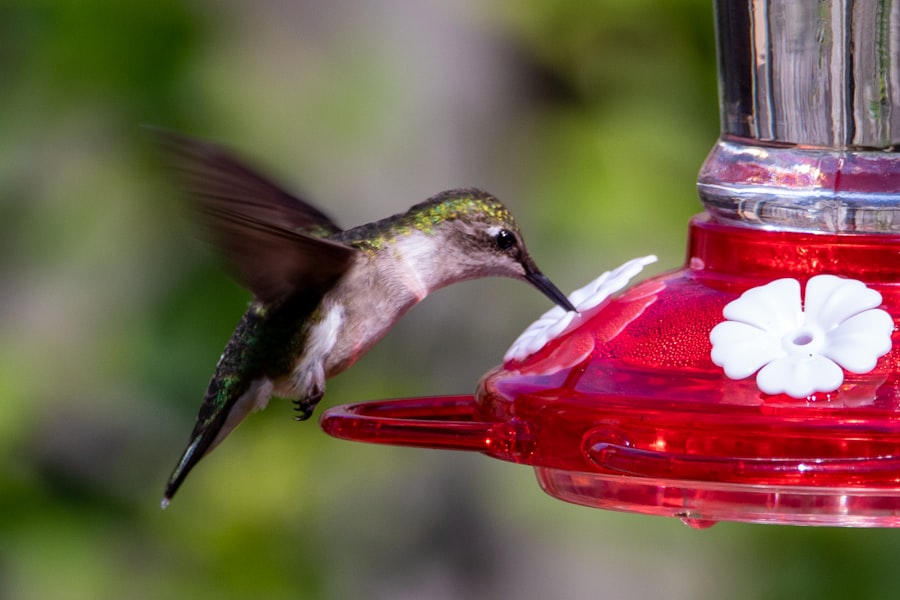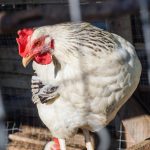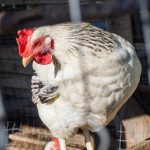When selecting chickens for a backyard flock, several factors should be considered. Climate is a crucial consideration, as some breeds are better adapted to cold weather, while others perform well in warmer environments. The intended purpose of the flock is also important; certain breeds are renowned for their egg production, while others are valued for meat quality.
Additionally, breed temperament varies, with some chickens being docile and friendly, and others more nervous or flighty. The Rhode Island Red is a popular breed for backyard flocks due to its excellent egg-laying capacity and adaptability to various climates. Orpingtons are another common choice, known for their friendly nature and cold-weather hardiness.
For those seeking a dual-purpose breed, the Plymouth Rock is notable for both egg production and meat quality. Ultimately, the ideal breed selection depends on specific requirements and preferences. Thorough research is essential before making a decision to ensure the chosen breed aligns with the keeper’s goals and local conditions.
Table of Contents
- 1 Preparing the coop and run
- 2 Feeding and watering
- 3 Providing entertainment and enrichment
- 4 Health and hygiene
- 5 Handling and socializing
- 6 Dealing with common challenges
- 7 FAQs
- 7.1 What are the benefits of keeping a pair of chickens?
- 7.2 What do chickens need in terms of housing and space?
- 7.3 What do chickens eat and drink?
- 7.4 What are some common health issues for chickens and how can they be prevented?
- 7.5 What are the legal considerations for keeping chickens?
- 7.6 How can I introduce new chickens to an existing flock?
Key Takeaways
- When selecting a breed, consider factors such as climate, space, and egg production to find the right fit for your needs.
- Prepare the coop and run by ensuring adequate space, ventilation, and protection from predators.
- Provide a balanced diet and clean water for your chickens, and consider supplements for optimal health.
- Keep chickens entertained and enriched with toys, perches, and access to outdoor space for foraging.
- Maintain good health and hygiene practices, including regular cleaning of the coop and monitoring for signs of illness.
- Handle and socialize your chickens regularly to build trust and reduce stress.
- Be prepared to address common challenges such as egg-eating, bullying, and mites with proactive solutions.
Preparing the coop and run
Coop Requirements
The coop should provide shelter from the elements and protection from predators. It’s crucial to ensure the coop is well-ventilated and has plenty of nesting boxes for the chickens to lay their eggs.
Run Essentials
The run should offer ample space for the chickens to roam and forage. It’s vital to securely fence the run to keep predators out and provide enough space for the chickens to move around. Consider adding enrichment items like perches or dust baths to keep your chickens entertained and engaged.
Maintenance and Hygiene
Regular cleaning and maintenance of both the coop and run are vital to prevent the spread of disease and parasites. Ensure good hygiene practices to keep your chickens healthy and thriving. By taking the time to properly prepare and maintain your coop and run, you can provide a safe and comfortable environment for your chickens to live in.
Feeding and watering

Feeding and watering your backyard flock is an essential part of keeping them healthy and happy. When it comes to feeding, it’s important to provide your chickens with a balanced diet that includes a mix of grains, protein, and fresh fruits and vegetables. You can purchase commercial chicken feed at your local feed store, or you can mix your own feed using ingredients such as corn, soybeans, and oats.
Additionally, it’s important to provide your chickens with access to fresh water at all times, as dehydration can quickly become a serious issue for chickens. In addition to their regular feed, chickens also enjoy foraging for insects and plants, so it’s a good idea to allow them access to a grassy area where they can scratch and peck. You may also want to consider supplementing their diet with treats such as mealworms or kitchen scraps, but it’s important to do so in moderation to avoid upsetting the balance of their diet.
By providing your chickens with a varied and nutritious diet, you can help ensure that they stay healthy and productive.
Providing entertainment and enrichment
Chickens are curious and intelligent animals, and providing them with entertainment and enrichment is an important part of keeping them happy and healthy. One simple way to provide enrichment for your chickens is by adding perches or roosts to their coop or run, which will give them a place to rest and observe their surroundings. You can also add items such as hanging mirrors or shiny objects, which will pique their curiosity and provide mental stimulation.
Another great way to keep your chickens entertained is by providing them with access to a dust bath. Chickens love to roll around in dust or sand, which helps them to keep their feathers clean and free of parasites. You can create a dust bath by filling a shallow container with sand or diatomaceous earth and placing it in the run for your chickens to enjoy.
Additionally, you can scatter treats or food around the run to encourage your chickens to forage and explore. By providing your chickens with plenty of opportunities for mental and physical stimulation, you can help ensure that they lead happy and fulfilling lives.
Health and hygiene
Keeping your backyard flock healthy and free from disease is essential for their well-being. One important aspect of maintaining good health in your chickens is practicing good hygiene in their coop and run. This means regularly cleaning out the coop, removing soiled bedding, and keeping the area free from debris and standing water.
Additionally, it’s important to regularly inspect your chickens for signs of illness or injury, such as lethargy, loss of appetite, or abnormal behavior. In addition to good hygiene practices, it’s also important to provide your chickens with regular access to veterinary care. This may include vaccinations against common poultry diseases, as well as regular check-ups to monitor their overall health.
It’s also important to keep an eye out for signs of parasites such as mites or lice, which can quickly spread among your flock if left untreated. By staying vigilant about the health and hygiene of your flock, you can help ensure that they stay happy and healthy for years to come.

Handling Your Chickens with Care
When handling your chickens, it’s crucial to do so gently and calmly, as sudden movements or loud noises can startle them. It’s also important to support their body properly when picking them up, as chickens can be fragile animals.
In addition to handling your chickens gently, it’s also vital to spend time socializing with them on a regular basis. This can include sitting with them in their run or coop, talking to them in a soothing voice, or offering them treats from your hand.
Building a Trusting Relationship
By spending time with your chickens on a regular basis, you can help them become more comfortable around you and build a trusting relationship with them. This will not only make them feel more at ease, but it will also make handling and caring for them a more enjoyable experience for both you and your flock.
Dealing with common challenges
Raising backyard chickens comes with its fair share of challenges, but with some preparation and know-how, you can overcome these obstacles and provide your flock with a happy and healthy life. One common challenge that chicken owners face is dealing with predators such as raccoons or hawks. To protect your flock from predators, it’s important to make sure that their coop and run are securely fenced and that there are no gaps or openings where predators could gain access.
Another common challenge is dealing with egg production issues, such as soft-shelled eggs or a decrease in laying. To help encourage healthy egg production, it’s important to provide your chickens with a balanced diet that includes plenty of calcium. You may also want to consider adding supplemental light to their coop during the winter months, as this can help stimulate egg production.
Finally, another common challenge is managing aggression within the flock. Chickens can be territorial animals, and conflicts between birds can arise from time to time. To help manage aggression within the flock, it’s important to provide plenty of space for the chickens to move around and establish a pecking order.
Additionally, providing multiple food and water sources can help reduce competition among the birds. In conclusion, raising backyard chickens can be a rewarding experience that provides you with fresh eggs, natural pest control, and the joy of caring for these charming animals. By selecting the right breed for your needs, preparing a suitable coop and run, providing a balanced diet and plenty of enrichment, maintaining good health and hygiene practices, handling and socializing with your flock regularly, and being prepared to deal with common challenges, you can create a happy and healthy environment for your backyard chickens to thrive in.
With some time and effort, you can enjoy all the benefits that come with raising your own flock of chickens.
If you’re considering keeping a pair of chickens, you may also be interested in learning about the best type of chicken coop for your feathered friends. Poultry Wizard offers a helpful article on chicken coop trampolines that provides valuable information on how to create a safe and comfortable living space for your chickens. This article can help you ensure that your chickens have a cozy and secure environment to thrive in.
FAQs
What are the benefits of keeping a pair of chickens?
Keeping a pair of chickens can provide a sustainable source of fresh eggs, natural pest control in the garden, and companionship.
What do chickens need in terms of housing and space?
Chickens need a secure and predator-proof coop with at least 2-3 square feet of space per bird, as well as access to a run or outdoor area for foraging.
What do chickens eat and drink?
Chickens require a balanced diet of commercial chicken feed, supplemented with kitchen scraps, grains, and access to fresh water at all times.
What are some common health issues for chickens and how can they be prevented?
Common health issues for chickens include parasites, respiratory infections, and egg-laying problems. These can be prevented through regular veterinary check-ups, a clean living environment, and a balanced diet.
What are the legal considerations for keeping chickens?
Before keeping chickens, it’s important to check local regulations and zoning laws regarding the number of chickens allowed, coop requirements, and any permits or licenses needed.
How can I introduce new chickens to an existing flock?
Introducing new chickens to an existing flock should be done gradually, allowing the birds to see and smell each other before introducing them into the same space. Monitoring for any signs of aggression is important during this process.
Meet Walter, the feathered-friend fanatic of Florida! Nestled in the sunshine state, Walter struts through life with his feathered companions, clucking his way to happiness. With a coop that’s fancier than a five-star hotel, he’s the Don Juan of the chicken world. When he’s not teaching his hens to do the cha-cha, you’ll find him in a heated debate with his prized rooster, Sir Clucks-a-Lot. Walter’s poultry passion is no yolk; he’s the sunny-side-up guy you never knew you needed in your flock of friends!







